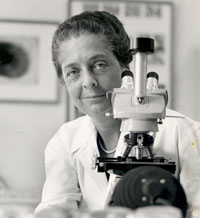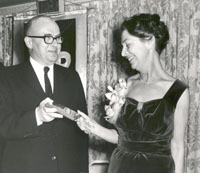Biographies
Rita Levi-Montalcini (b. 1909)
 |
| Rita Levi-Montalcini, ca. 1963 |
Neurophysiologist Rita Levi-Montalcini shared the 1986 Nobel Prize for physiology or medicine with biochemist Stanley Cohen for their discovery of nerve growth factor (NGF), a protein that causes developing cells to grow by stimulating surrounding nerve tissue. Their research, conducted in the 1950s, while members of the faculty of Washington University, is of fundamental importance to the understanding of cell and organ growth and plays a significant role in understanding cancers and diseases such as Alzheimer’s and Parkinson’s.
Born into an intellectual, though traditional, family in Turin, Italy, Rita Levi-Montalcini had to overcome her father’s objections to her enrolling in college. She entered the University of Turin to study medicine, despite her father’s belief that women should not pursue careers. She graduated summa cum laude from the University of Turin Medical School in 1936, and then completed a degree for specialization in neurology and psychiatry in 1940. Fascist laws prevented Italian Jews from practicing medicine or working in universities at that time, so Levi-Montalcini set up laboratory equipment in her bedroom to continue her research on neurogenesis. When the family was forced to leave Turin in 1941due to the heavy Allied bombing of the city, Levi-Montalcini rebuilt her laboratory in the family’s country cottage. When the Germans invaded Italy in the fall of 1943, the family moved to Florence where they lived underground until the end of the war. After Allied armies forced the Germans out of Florence in August 1944, Levi-Montalcini worked as a medical doctor in an Italian refugee camp, treating epidemics of infectious diseases and abdominal typhus.
After the war, her family returned to Turin and Levi-Montalcini resumed her position as an assistant at the University of Turin Institute of Anatomy. Two articles that Levi-Montalcini had published in foreign scientific journals interested Viktor Hamburger, head of the Zoology Department of Washington University in St. Louis. In September 1947 Rita Levi-Montalcini accepted Hamburger’s invitation to collaborate with him as a research associate. Though she initially planned to stay at Washington University for less than one year, Levi-Montalcini stayed for thirty years. She was named an associate professor of Zoology in 1951, and a full professor in 1958. In the early 1960s Levi-Montalcini began dividing her time between St. Louis and Italy. She established a laboratory at the Higher Institute of Health in Rome, which participated in a joint research program with Washington University from 1961 to 1969. In 1969 she established the Laboratory of Cell Biology of the Italian National Research Council in Rome, serving as its director until 1979, and then as guest professor. In the mid-1960s the Washington University Zoology Department was incorporated into the Biology Department. Levi-Montalcini retired as professor emeritus of Biology in 1977.
 |
| Rita Levi-Montalcini receiving the Max Weinstein Award from the United Cerebral Palsy Association, 1963 |
In addition to the Nobel Prize, Levi-Montalcini has received many honors and awards. In 1963 she was the first woman scientist to receive the Max Weinstein Award, given by the United Cerebral Palsy Association for outstanding contributions in neurological research. In 1975 Levi-Montalcini became the first woman to be installed in the Pontifical Scientific Academy. She is a recipient of the International Feltrinelli Medical Award of the Accademia Nazionale die Lincei, Rome (1969), the William Thomson Wakeman Award of the National Paraplegia Foundation (1974), the Lewis S. Rosentiel Award for Distinguished work in Basic Medical Research of Brandeis University (1982), the Louisa Gross Horwitz Prize of Columbia University (1983), the Albert Lasker Basic Medical Research Award (1986), and the National Medal of Science (1987). She is a member of the American Academy of Arts and Sciences, the National Academy of Sciences, and the National Academy of Sciences of Italy. In 1999, the Food and Agriculture Organization of the United Nations named Rita Levi-Montalcini one of its first four FAO Ambassadors, to help in its campaign against world hunger.
Related Links:
Return to WUMC Faculty/Staff (Biographies)
Return to All Biographies
Back to Top
